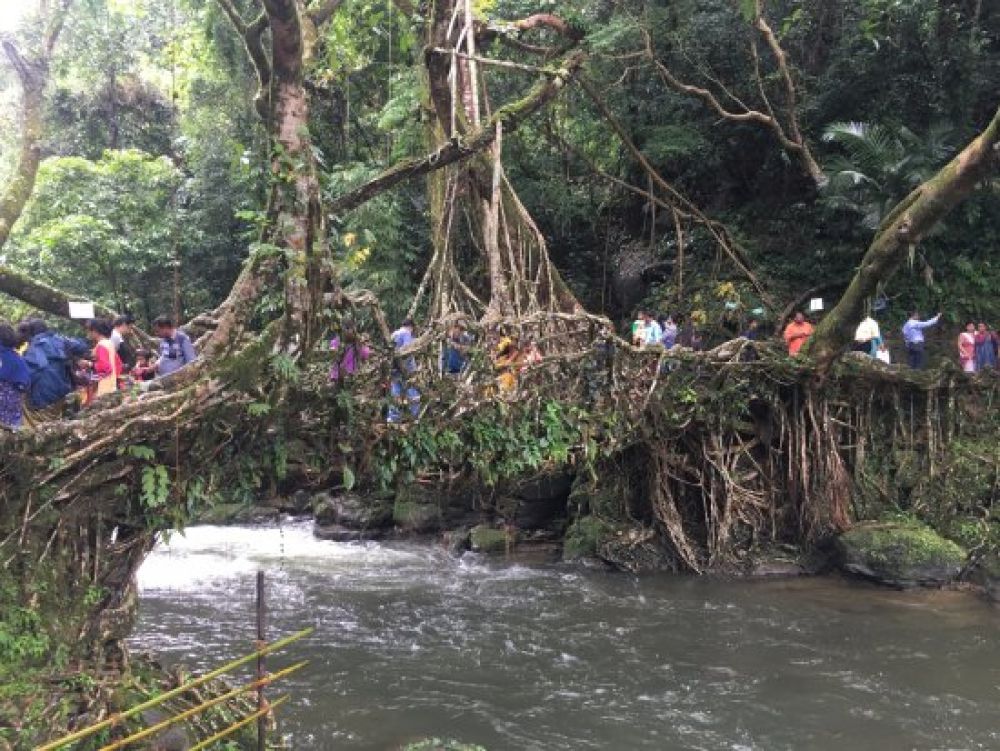

The small village of Mawlynnong, nestled in the lush greenery of the East Khasi Hills in Meghalaya, India, has been a cradle of eco-friendly living and community-based tourism for years. Recognized as one of the cleanest villages in Asia, Mawlynnong's tourism history is as enchanting as the place itself, with its pinnacle being the mesmerizing Riwai Root Bridge.
Tourism in Mawlynnong began to flourish with the recognition of its cleanliness and the unique living root bridges, a testimony to the ingenuity of the Khasi tribes. Constructed from the aerial roots of Rubber Fig Trees, these bridges take decades to become fully functional. Over time, they've become breathtaking attractions, showcasing harmony between human civilization and nature.
The Riwai Root Bridge, which is a single-decker living root bridge, is a prime example of this symbiotic relationship. Estimated to be over a hundred years old, the bridge is fashioned by skillfully guiding the roots of the trees across a stream and allowing them to grow and strengthen over time. As years passed, word of Riwai's natural marvel spread, luring tourists interested in eco-sustainable structures and indigenous cultures.
Tourism got a significant boost when Mawlynnong was titled "Asia's Cleanest Village" by Discover India magazine in 2003. This accolade brought the village and the Riwai Root Bridge into the limelight, and the community seized the opportunity to promote ecotourism and cultural experiences. Visitors don't merely come for sightseeing but to immerse themselves in the lifestyle of the villagers, learn about their matrilineal society, and partake in sustainable living practices.
Today, visitors to the Riwai Root Bridge and Mawlynnong can engage in various activities including guided tours, homestays, and even participate in local chores to get a true taste of rural life. Cultural immersion has been a driving force, with guests often found enjoying native Khasi food and attending traditional performances.
Mawlynnong's success in tourism is largely due to its focus on community involvement. Villagers ensure the preservation of their environment and cultural heritage by offering clean accommodations and maintaining the ecology of the area. The Riwai Root Bridge stands as a sentinel to the traditions that the locals hold dear – a reminder for tourists of the balance that can be achieved between nature and humankind.
The ongoing interest in the Riwai Root Bridge and Mawlynnong has led to increased awareness about preserving such wonders. With mentions in numerous travel publications and documentaries, Riwai continues to draw global attention to the Khasi hills' unique bioengineering practices and their potential for sustainable tourism.
When visiting, tourists are encouraged to respect the bridge's delicate nature and the villagers' way of life, as these are integral to the region's allure and sustainability. The thoughtful intersection of tourism and local lifestyle seen at the Riwai Root Bridge is a blueprint for future destination management and development, championing both conservation and cultural integrity.
In conclusion, the history of tourism in Mawlynnong and the fascination with the Riwai Root Bridge reveals a journey from obscurity to admiration, brought about by sustainable practices and an ethos of preservation. It serves as an inspiration for destinations worldwide to develop tourism responsibly, while honoring their natural and cultural heritage.